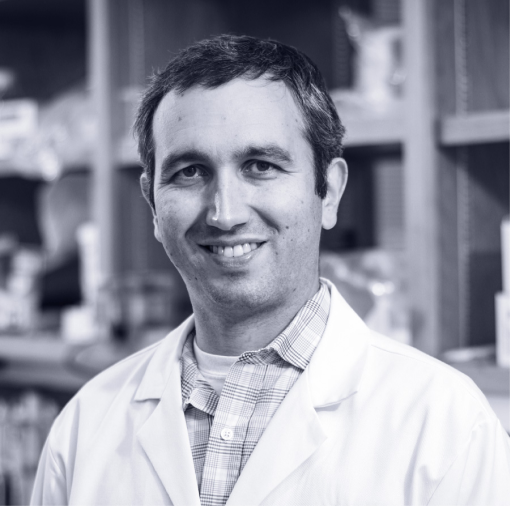
Ryan Muldoon is a life sciences commercial executive. He has spent more than two decades in drug development and commercialization, most recently as the co-founder and CEO of PrEP Biopharm, Ltd. Previously, he served as a commercial executive at Johnson & Johnson and Bristol-Myers Squibb leading commercial teams across sales, marketing, and business development. He holds a master’s degree from Thunderbird and a bachelor’s degree from Emory University.

Li-Tao Guo is the cofounder and VP of Research and Development of RNAConnect. He received a Ph.D in Molecular Biology and Biochemistry from Shanghai Institute of Biochemistry and Cell Biology, Chinese Academy of Sciences with Professor Youxin Jin in 2002. Then he served as a postdoc with Professor Dieter Söll at Yale University. In 2018, Dr. Guo joined Anna Pyle lab at Yale University, focusing on the research and development of MarathonRT. His work established MarathonRT as a powerful tool enzyme in various applications in RNA research, which promoted the foundation of RNAConnect.

Jason Underwood is a molecular biologist with decades of experience in the everchanging field of RNA biology. He joined RNAConnect from PacBio where he led development of long read RNA-seq from a concept at the bench through optimization, commercialization and scaling. Jason studied the regulation of alternative splicing in the brain for his Ph.D. at UCLA before diving into genomics and transcriptomics technology development in academia and industry. As a postdoc at UC-Santa Cruz, he pioneered one of the first high throughput RNA structure probing methods to use next-generation sequencing.

Jen is a seasoned sales and marketing professional with over a decade of experience in the life sciences sector, focusing on genomic reagents, instruments, and software. With a background in cytogenetics, she excels in developing and executing marketing strategies, leading product launches, and organizing customer events. Jen holds an MBA in Healthcare Management and actively contributes to the Chicago Council on Science & Technology as Auxiliary Board Co-President, advocating for "STEM for all."

After leaving a career in marketing to pursue his passion, George Maio enrolled in Lehman College where he performed undergraduate research studying DNA aptamers. In 2017, he was awarded the New York ACS William H. Nichols Fellows, achieved first authorship for developing an AML targeted aptamer, and obtained his Bachelor’s in Chemistry with a concentration in Biochemistry.
He obtained his PhD in Chemical Biology at Cornell University where he generated quantitative protein interaction networks to uncover novel functions of proteins shown to promote cancer progression.

Spencer Glantz, PhD, is a co-founder and Vice President of Research & Development at Detect, Inc., a startup developing “point-of-need” diagnostic tests to increase access to testing, improve patient outcomes, and reduce healthcare costs. He is passionate about applying biology to improve the world we live in, from human health to agriculture to the environment. He holds a PhD in Bioengineering and a B.S.E. in Chemical Engineering from the University of Pennsylvania.

Ryan Muldoon is a life sciences commercial executive. He has spent more than two decades in drug development and commercialization, most recently as the co-founder and CEO of PrEP Biopharm, Ltd. Previously, he served as a commercial executive at Johnson & Johnson and Bristol-Myers Squibb leading commercial teams across sales, marketing, and business development. He holds a master’s degree from Thunderbird and a bachelor’s degree from Emory University.

Spencer Glantz, PhD, is a co-founder and Vice President of Research & Development at Detect, Inc., a startup developing “point-of-need” diagnostic tests to increase access to testing, improve patient outcomes, and reduce healthcare costs. He is passionate about applying biology to improve the world we live in, from human health to agriculture to the environment. He holds a PhD in Bioengineering and a B.S.E. in Chemical Engineering from the University of Pennsylvania.

Brenton R. Graveley, PhD, is Professor and Chair of Genetics and Genome Sciences at UConn Health, the Health Net, Inc. Endowed Chair in Genetics and Developmental Biology, and the Associate Director of the UConn Institute for Systems Genomics. He earned his PhD in Microbiology and Molecular Genetics at the University of Vermont, his bachelor’s degree in Molecular, Cellular, and Developmental Biology from the University of Colorado, and was a postdoctoral fellow with Tom Maniatis at Harvard University. He is also an elected member of the Connecticut Academy of Science and Engineering.

Anthony Mustoe, PhD, is an Assistant Professor of Biochemistry at Baylor College of Medicine. He earned his PhD in Biophysics from the University of Michigan and completed a postdoctoral fellowship at the University of North Carolina. He is passionate about the discovery and functional characterization of RNA structure and dynamics in RNA metabolism. The goal of his lab is to define the sequence-structure-function relationships that underpin mRNA regulation and non-coding function in cells, with the aim of translating these findings into mechanistic understanding of RNA dysregulation in disease and developing new precision therapeutics for targeting RNA.

Sigrid Nachtergaele, PhD, is an Assistant Professor of Molecular, Cellular & Developmental Biology at Yale. She received her undergraduate degree from the University of Chicago and her PhD from Stanford University. She was a postdoctoral fellow with Chuan He at the University of Chicago, where she set out to identify novel chemical modifications in mRNA and uncover their functions. While these modifications are known to influence RNA processing, stability, and function, much less is known about how these modifications are regulated by and influence cell signaling. Her lab at Yale is focused on identifying these mechanisms, with the goal of identifying new modes of RNA-mediated regulation of cell signaling.A

Anna Pyle, PhD, is the Yale Sterling Professor in Molecular, Cellular, and Developmental Biology and Chemistry. After graduating from Princeton University, Dr. Pyle received a PhD in Chemistry from Columbia University in 1990. She formed her own research group in 1992 in the Department of Biochemistry and Molecular Biophysics at Columbia University Medical Center. In 2002, she moved to Yale, where her group studies the structure and function of large RNA molecules and associated protein enzymes. She is Past-President of the RNA Society, Vice-Chair of the Science and Technology Steering Committee for Brookhaven National Laboratory, and she serves on SABs for the Max Planck Institute for Multidisciplinary Sciences and the Helmholz Center for Infection Research. She is the founder of RIGImmune and RNAConnect and author of over 250 publications.

Antoine-Emmanuel Saliba, PhD, is a Professor at the University of Wűrzburg and Group Leader of the Helmholtz Institute for RNA-based Infection where he leads the single-cell analysis group. He performed his undergraduate studies in biochemical engineering at the INSA Toulouse (France) and performed his doctoral work under the supervision of Jean-Louis Viovy at the Institut Curie (Paris, France). During this time, he pioneered the development of microfluidics-based integrated systems to sort and analyze rare cancer cell subpopulations. As postdoctoral EIPOD-fellow within the European Molecular Biology Laboratory (Heidelberg, Germany), he developed one of the first systems-biology approaches to track protein-lipid interactions on the genome-scale.

Eric Van Nostrand, PhD, is an Assistant Professor in the Department of Biochemistry and Molecular Pharmacology and the Therapeutic Innovation Center at Baylor College of Medicine. He earned his PhD from Stanford University School of Medicine and his BS from the Massachusetts Institute of Technology, and completed his postdoctoral training at the University of California San Diego. His group uses a variety of genomics, molecular biology, and computational approaches to map and understand RNA processing regulatory networks, with the goal of uncovering new mechanisms in RNA processing and characterizing their roles in human physiology.


